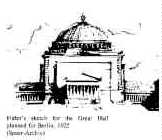
Next: Whittle Headquarters: An Architecture of Decency and Deceit
Up: Hacked Inhabitants Docs • Web services
Degenerate Art and the New Corporate Style
Michael Kaplan
Associate Professor of Architecture
University of Tennessee / Knoxville
"If only our totally superficial culture of today, which loves rapid
change, could visualize the future by learning to look more closely at the
past! This rage for innovation that collapses foundations, this foolish
negligence of the deep spiritual content in life and art, this modern concept
of life as a rapid sequence of instant pleasures, ... so many signs of decadence,
a sad denial of health and of the transcendent character of life." Martin
Heidegger
The epigraph from Heidegger's Abraham a Sancta Clara, written in 1910
and excerpted by Victor Farias in Heidegger and Nazism, reveals a
virulent anti-modernist stance that later became the ideological substrate
of Nazi cultural revisionism. Appropriated by Hitler in his writings on the
degeneracy of modern art, this position formed the basis for the attack on
progressive German culture leading to a ban on art criticism in 1936 and
the slanderous Entartete Kunst (Degenerate Art) exhibit of Germany's
great modern artists mounted in Munich in 1937.
 The
relation of trends in the theoretical and practical architectural agenda
to the conservative political climate of the last two decades has become
a subject of speculation and debate. Bruno Zevi, advocate of modernism, argues
that certain formal aspects of historicism interface with ideological intents
of fascism. Leon Krier, while acknowledging the appropriation
of the classical style by totalitarian forces, believes the convergence
incidental and not an indictment of the style. David
Harvey, in The Condition of Post-Modernity, frames the debate in terms of
"a search for an appropriate myth" where modernist art served a capitalist
version of the Enlightenment, and classicism a reaction to the universalist
implications of technology.
The
relation of trends in the theoretical and practical architectural agenda
to the conservative political climate of the last two decades has become
a subject of speculation and debate. Bruno Zevi, advocate of modernism, argues
that certain formal aspects of historicism interface with ideological intents
of fascism. Leon Krier, while acknowledging the appropriation
of the classical style by totalitarian forces, believes the convergence
incidental and not an indictment of the style. David
Harvey, in The Condition of Post-Modernity, frames the debate in terms of
"a search for an appropriate myth" where modernist art served a capitalist
version of the Enlightenment, and classicism a reaction to the universalist
implications of technology.
In the context of the current debate, and within the framework of Harvey's
'appropriate myth' theory, this paper examines two examples of contemporary
architecture -- one historicist and the other modernist -- by relating their
stylistic language to the agenda of their patrons.
Whittle Headquarters: An Architecture of Decency and Deceit ·
Degenerate Art: An architecture of respect and retreat ·
Lessons of fascism ·
Epilogue ·
Fax from Leon Krier to Professor Kaplan
Hacked Inhabitants Docs
© 1999-2021
 The
relation of trends in the theoretical and practical architectural agenda
to the conservative political climate of the last two decades has become
a subject of speculation and debate. Bruno Zevi, advocate of modernism, argues
that certain formal aspects of historicism interface with ideological intents
of fascism. Leon Krier, while acknowledging the appropriation
of the classical style by totalitarian forces, believes the convergence
incidental and not an indictment of the style. David
Harvey, in The Condition of Post-Modernity, frames the debate in terms of
"a search for an appropriate myth" where modernist art served a capitalist
version of the Enlightenment, and classicism a reaction to the universalist
implications of technology.
The
relation of trends in the theoretical and practical architectural agenda
to the conservative political climate of the last two decades has become
a subject of speculation and debate. Bruno Zevi, advocate of modernism, argues
that certain formal aspects of historicism interface with ideological intents
of fascism. Leon Krier, while acknowledging the appropriation
of the classical style by totalitarian forces, believes the convergence
incidental and not an indictment of the style. David
Harvey, in The Condition of Post-Modernity, frames the debate in terms of
"a search for an appropriate myth" where modernist art served a capitalist
version of the Enlightenment, and classicism a reaction to the universalist
implications of technology.
